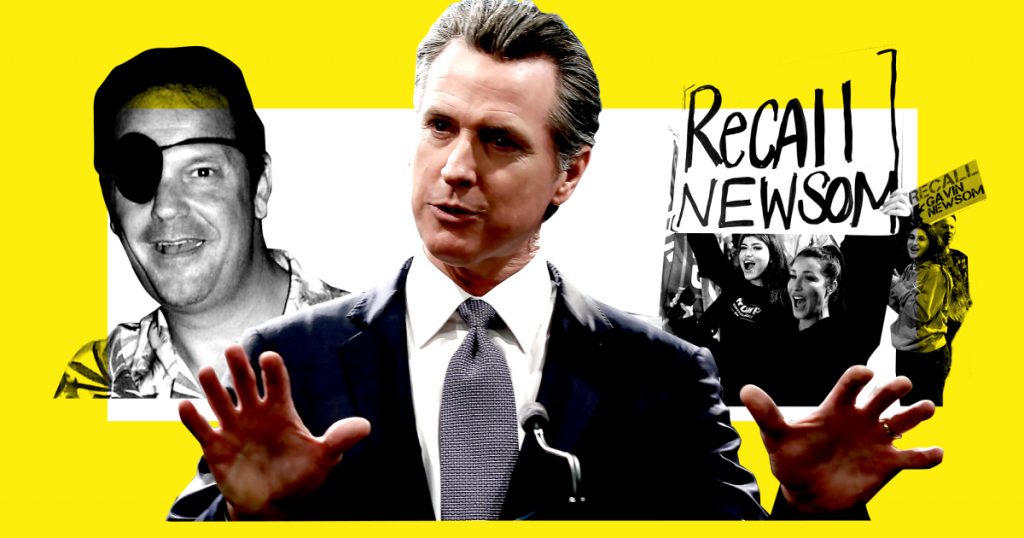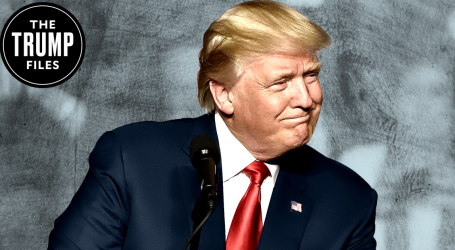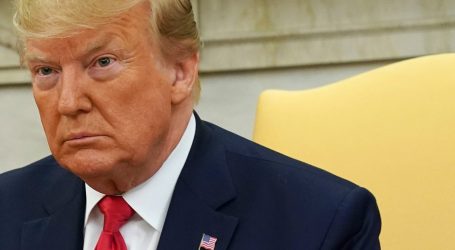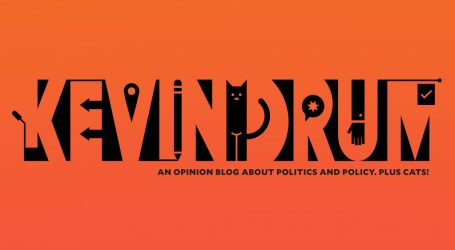This “Superhero Pirate” Radio Host Is Gavin Newsom’s Strangest—and Most Dangerous—Threat
Let our journalists help you make sense of the noise: Subscribe to the Mother Jones Daily newsletter and get a recap of news that matters.Randy Economy feels “blessed.” The conservative broadcaster and ex-Trump campaign staffer says he’s done more than 1,000 media interviews in the last 10 weeks, and between fielding outside press and producing his own show, spends up to 17 hours per day on what he calls his life’s greatest work: RecallGavin2020, the drive to kick California Gov. Gavin Newsom out of office.
From his home in Southern California’s Coachella Valley, Economy’s one-man media machine—he’s the campaign spokesperson and senior adviser—has turned that fringe demand into an increasingly real threat. As quarantine fatigue has spread, a cause once pushed mainly by anti-vaxxers, QAnon conspiracists, and other right-wing radicals has ballooned into a home for GOP heavyweights and a handful of Silicon Valley multimillionaires. Everyone in California is mad. Economy just had to sell them on the solution: Blame Newsom. The year-old recall campaign is only 100,000 signatures shy of the 1.5 million it needs to trigger a special election; if Newsom loses, he’ll become the state’s second recalled governor in two decades.
Economy (his real name) is an unlikely hero for an unlikely movement. A white man in his early 60s, often in suit and tie, he could pass for any conservative talking head—if not for his iconic eyepatch, which he started to don after a stroke claimed his sight in one eye. Though Economy has since swapped the patch for glasses, he still incorporates it into his public image: “He wears an eyepatch, but can spot fake news a mile away, like a superhero pirate,” an announcer booms in the bombastic intro to his radio show. (Economy’s LinkedIn profile also lists him as fluent in “Pirate.”)
https://www.facebook.com/1290503136/videos/10225252163233041/
Economy’s start in politics came in the 1980s after a stint at Hearst Media, when he landed a spot on the press team for the Los Angeles suburb of Norwalk. That led to a job managing the City Council campaign of now-Rep. Grace Napolitano (D-Calif.), then a local politician, and by 1988, Economy was mounting his own run for City Council. He lost that race, along with a later one for the local school board. (He was, though, a successful game-show contestant for much of the decade.)
Even if Economy’s bids for office went nowhere, he learned something about how to court influence and power from the sidelines. In 2003, he served as a member of the Los Angeles County Democratic Party representing his hometown of Cerritos. In his capacity as a Democratic politico, Economy says he was in the Los Angeles hotel ballroom where Gray Davis, California’s governor from 1999 to 2003, found out he’d lost the first gubernatorial recall election to novice Republican challenger Arnold Schwarzenegger.
By 2010, Economy was back in journalism, working the corruption beat for a suburban LA newspaper. But that second life took a dark turn after Economy said he’d manufactured fake news at his boss’s behest: When a defamation suit hit the paper, Economy wrote in an affidavit that he’d worked to “discredit, defame, embarrass, belittle, smear and otherwise destroy the reputation and standing” of members of a municipal water board. (“I’ve had to get absolved from my sins by a Catholic priest,” Economy, a steadfast Catholic, told LA Weekly in the aftermath. The publisher denied wrongdoing, and the suit was eventually dismissed.) His blog and LinkedIn profiles describe him as a Pulitzer Prize nominee, though his samples were “submitted with no recognition,” the Coachella Valley Desert Sun found. Another website offers Economy’s services as a private investigator.
In the runup to the 2016 election, Economy says he was lured by Donald Trump’s rapport with the “average” voter. “I don’t agree with a lot of things that [Trump] did,” he told me, “but when you get involved at a senior level in this business of politics, it’s multilayered.” Economy soon began supporting the Trump campaign in California, even flying to Cleveland to attend the 2016 Republican National Convention. The Trump position led to other gigs—in the 2020 elections, Economy advised the GOP challenger to Trump impeachment manager Rep. Adam Schiff.
Then California’s pandemic response put Newsom in Economy’s crosshairs. In March, the governor signed an executive order to halt intake at state prisons; in April, the state’s prison bureau released more than 3,000 people incarcerated for non-violent offenses to reduce the virus’s spread. “You cannot arbitrarily lock people into their houses like prisoners and let prisoners out of jail,” Economy told me, fuming.
https://www.instagram.com/p/CJ7FpZLgrKc/?igshid=1571hn5xevxy
Days after the November general election, Newsom was photographed at a lobbyist’s birthday dinner at the French Laundry, a Michelin-starred wine-country restaurant beloved by California’s wealthy. When that story broke, Economy says, it became a “defining point,” cementing his conviction that the governor had to go. A recall petition had been filed earlier in the year by a retired police sergeant named Orrin Heatlie. After the French Laundry incident, Economy met with Heatlie and became a full-time anti-Newsom crusader.
Like the challenge to Schiff, who won by 45 points, the Newsom recall has the look of a lost cause—not least because of Heatlie’s connections to the world of fringe conspiracists. Politico reported that Heatlie posted anti-immigrant vitriol and supported pandemic conspiracy theories on social media, and the Los Angeles Times has uncovered posts by the campaign’s chief financial officer, Robin McCrea, arguing that antifa was responsible for the January 6 attack on the Capitol. The group paying to circulate the petition, the California Patriot Coalition, is also part of a nationwide extremist network linked to acts of vigilantism and street violence during last summer’s protests in Portland, Oregon.
“I don’t think we’re going to turn away support from anybody, and nor should we because California does come in all shapes and sizes,” Economy said when I asked about links between the recall movement and backers of the QAnon conspiracy and Capitol insurrection. He did condemn a recent Los Angeles anti-vaccine protest that temporarily halted mass vaccinations at Dodger Stadium.
California politics expert Zev Yaroslavsky, a veteran of the Los Angeles City Council, says not to take the recall effort for granted. “People thought that Gray Davis would survive a recall,” Yaroslavsky says. And in the years since, he points out, “politics has become far more polarized and much more tribal.”
Economy is right about at least one thing: The pandemic has led to widespread political disaffection, much of it directed at Newsom. Californians are angry with the governor for either imposing too many or too few restrictions, depending on whom you ask—and everyone is pissed about the French Laundry. The sighting may help explain Newsom’s shaky approval ratings, which have plummeted from 60 percent in September to just 46 percent in February polling.
That frustration has elevated Economy’s campaign and given Newsom’s political opponents an opening. Former state GOP chair Tom Del Beccaro is heading up Rescue California, the long-defunct PAC that helped recall Gov. Davis in 2003 and which Del Beccaro has revived to back RecallGavin2020. (Del Beccaro has published opinion pieces in the pro-Trump Epoch Times referring to the coronavirus as the “CCP [Chinese Communist Party] virus.”)
Some of the campaign’s biggest monetary backing has come from Silicon Valley moguls dissatisfied with the state’s attempts to regulate Big Tech. Billionaire investor and Golden State Warriors part-owner Chamath Palihapitiya may not share Economy’s self-proclaimed “fiercely independent” politics, but that didn’t keep him from donating $100,000 to the recall effort—after hinting at his own plans to challenge Newsom. (Palihapitiya has since said he won’t run.) Venture capitalist Doug Leone and his wife have also donated about $100,000 to the recall effort. The investor and former PayPal executive David Sacks is another recall backer; his wife, Jacqueline, gave $25,000 in support.
Tech journalist and researcher Greg Ferenstein says that moves like Palihapitiya’s are “pretty typical of neophyte tech people,” who often lack the political expertise to parlay their immense wealth into electoral power. Still, Ferenstein says the recall lacks “broad support” from Big Tech. “I think the recall effort is largely isolated people in the tech industry, who are using it as an excuse to advance their kind of pet projects or individual ambitions,” says Ferenstein. More prominent Silicon Valley billionaires have remained quiet, or, like Netflix CEO Reed Hastings, donated to Newsom’s reelection.
Economy is pleased by the small but growing vein of Silicon Valley support. “I think it’s emblematic of what we’ve been able to accomplish at our all-grassroots campaign,” he says.
Though Republican politicos like former San Diego Mayor Kevin Faulconer and former Republican gubernatorial candidate John Cox have signaled plans to challenge Newsom in any special election, Economy says the recall campaign won’t endorse a candidate—and despite the wave of GOP financial support, that the campaign doesn’t explicitly align with the Republican Party.
If Newsom survives, the recall’s real success might not be in any one candidate, but in the ties Economy has helped forge between lockdown-weary locals, big business, and the right wing of Silicon Valley—no small return for his debut in California’s political spotlight.
“I saw it coming,” Economy says of the state’s 2003 recall, an upset loss in which voters pinned everything from economic stagnation to the Enron crisis on Gov. Gray Davis months into his second term. “And now the same thing is happening. Gavin Newsom is no different than Gray Davis. I just happen to be on the other side now, and that’s kind of fun.”
Image credit from left: Stephen Shugerman/Getty; Rich Pedroncell/AP, Marcio Jose Sanchez/AP





